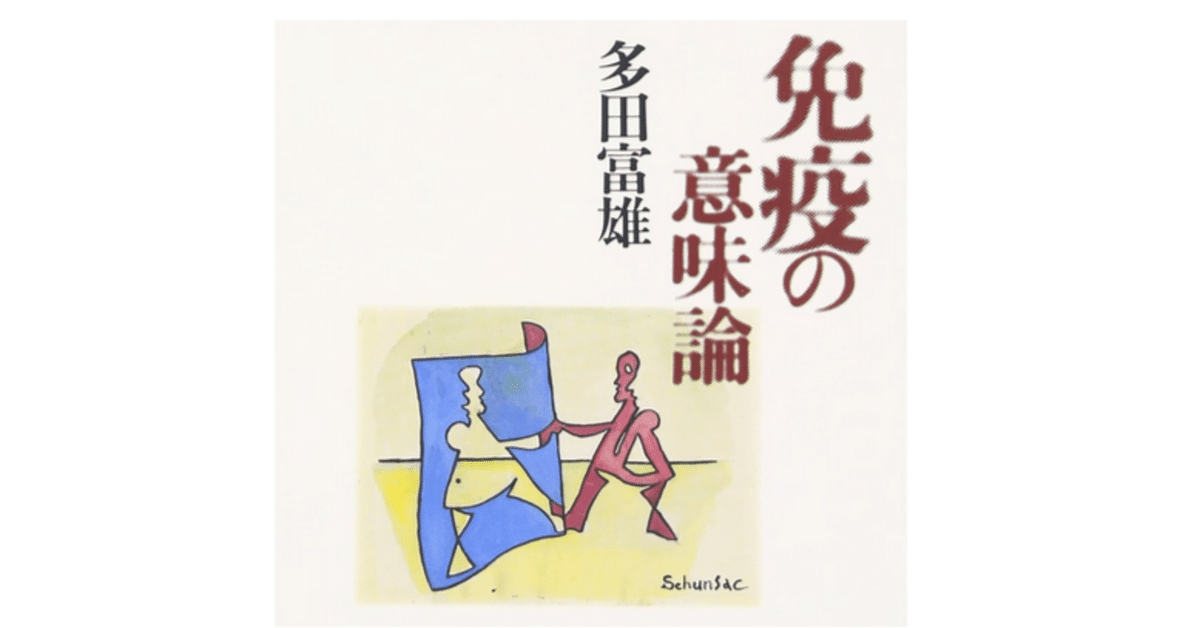
多田富雄さんの『免疫の意味論』は私には手ごわすぎた
無職になって、これまでに買い集めた本を少しづつ読んでいる。
他にあまりすることがない、というせいでもある。
とはいえ、今年の夏も暑い。
夜も朝もエアコンなしだと30度を超える、という状態ではやる気が起きない。
目がくたびれるし、若い頃のように、ひたむきに読む、ということもできない。
読んでみて、手元に置いておく必要がなく、必要なら図書館で借りればいい、と思った本は、ブックオフで売る。読んだことを記録しておきたいと思ったら、noteに書くだろう。
さて、多田富雄さんの『免疫の意味論』だ。大学などでこの本を使った授業があれば、受講するのが一番よさそうだ。読んだだけではわからないところが多い。
とはいえ、印象に残った箇所は、書き留めておこう。
一番目は、胸腺という器官についてである。
胸腺(きょうせん、英: thymus)は胸腔に存在し、T細胞の分化、成熟など免疫系に関与する一次リンパ器官。胸小葉とよばれる二葉からなっており、胸骨の後ろ、心臓の前に位置し、心臓に乗るように存在する。
この器官の存在は、紀元前40年前のローマの解剖学の書物に記述されている。しかし、その免疫機能は1960年代まで不明だった。
胸腺は十代の後半に最も大きくなるが、四十代では半分、六十代では四分の一に縮小し、八十代になると、ほとんどが脂肪に置き代わる。身体の免疫機能は大丈夫かと思うが、心配しなくていいらしい。
出生直後のマウスで胸腺摘出を行うと、マウスは免疫不全に陥るが、成熟マウスで摘出をしても免疫系に影響は少ない。これは、成熟した個体では十分なT細胞のプールができ、末梢でもリンパ球が生理的増殖を行うようになるからである。
二番目は、アレルギーに関してである。
日本では、杉などの花粉症を患う人が多いが、アメリカ合衆国では、推定35百万人のアレルギー患者がいて、ブタ草の花粉が飛散する9月には、大勢の人が苦しむ。
ハチに刺されてショック死したとか、羽毛枕で寝ていた人が喘息で苦しんだ、などの事例は知られていたが、アレルギーという言葉は、1906年にある学者が作った。
人に「何かアレルギーがありますか?」を英語で尋ねる時の英文を、ラジオ英会話で習ったことを思い出した。
"Are you allergic to something?"
Tomio Tada's book "Semantics of Immunity" was too difficult for me.
Now that I'm unemployed, I've been reading the books I've collected over the years, little by little. Part of the reason is that there isn't much else to do.
But this summer has been hot, too. It's hard to find motivation to read when it's over 30 degrees at night and in the morning without air conditioning. My eyes get tired, and I can't read intently like I did when I was younger.
If I read a book and decide I don't need to keep it and can just borrow it from the library if necessary, I sell it at BOOKOFF. If I want to keep a record of what I've read, I'll write it on Note.
Now, let's look at "Semantics of Immunity" by Tomio Tada. If there is a class using this book at a university or other institution, it would be best to take it. There are many things I can't understand just by reading it.
Nevertheless, I will write down the parts that made an impression on me.
The first one is about an organ called the thymus.
The thymus is a primary lymphoid organ located in the thoracic cavity and involved in the immune system, including the differentiation and maturation of T cells. It consists of two lobes called thoracic lobules and is located behind the sternum and in front of the heart, resting on the heart.
The existence of this organ was described in a Roman anatomical book dating back to 40 BC. However, its immune function was unknown until the 1960s.
The thymus gland is at its largest in our late teens, but shrinks to half its size in our 40s and one-quarter in our 60s, and by our 80s it has been replaced by mostly fat. I wonder if our body's immune function is okay, but apparently there's no need to worry.
Thymectomy in newborn mice results in immunodeficiency, but thymectomy in adult mice has little effect on the immune system because mature mice have a sufficient pool of T cells and lymphocytes proliferate physiologically in the periphery.
The second is about allergies.
In Japan, many people suffer from hay fever caused by pollen from trees such as cedars, but in the United States, an estimated 35 million people suffer from allergies, and many people suffer in September when ragweed pollen is released into the air.
There were known cases of people dying of shock after being stung by a bee, or people suffering from asthma after sleeping on feather pillows, but the word allergy was coined by a scholar in 1906.
I remembered learning the English phrase for asking someone "Are you allergic to something?" on Radio English Conversation.
この記事が気に入ったらサポートをしてみませんか?
